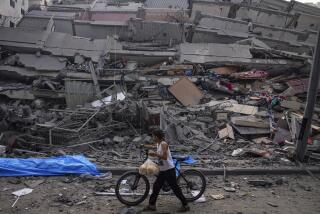Not a Lack of Compassion, but of Information
- Share via
Compassion fatigue is an odd affliction. Rarely if ever mentioned by those who are supposed to suffer from it--average Americans--it is a favorite buzzword of media representatives and political pundits. The American people, they tell us, would rather hear yet again the details of President Clinton’s behavior or learn about the adventures of Sen. John Glenn, six cockroaches and a handful of tomato seeds in outer space than be troubled by, let’s say, a catastrophe in Africa.
I beg to differ. This past August, I worked in one of Doctors Without Borders’ feeding centers in Ajiep in southern Sudan. Faced in the morning with the tiny bodies of children who did not survive the previous night and the near-skeletons who were unlikely to last another day without help, it struck me that compassion fatigue is a human impossibility.
Closer to home, I get the same feeling. Over the past couple of months, the Los Angeles office of Doctors Without Borders has experienced a sudden outpouring of compassion and support for those starving in southern Sudan. This came after three TV stations--KTTV, KCET and KCAL--broke the virtual silence in the mainstream media and showed stories about the famine in Sudan.
Abdul from the Redlands University football team called to ask whether he and some friends from the team could raise money. Tiffany from Compton wondered if there was a minimum donation or whether people with limited means could in some way support the volunteer doctors and nurses fighting the famine. Max from Hawthorne noted the irony that we spend millions of dollars sending people to outer space while children are starving to death on Earth.
These experiences have convinced me that compassion fatigue is just a name for the lack of editorial responsibility in mainstream media outlets. Americans do not suffer from a shortage of compassion, they suffer from a lack of information about pressing international issues. Through the coverage of the Clinton-Lewinsky scandal and the recent space adventures, journalists have demonstrated, if nothing else, that they are capable of in-depth reporting of continually changing stories. Why not a portion of that attention to the human tragedy in Sudan?
International coverage does not have to come at the expense of concern with domestic issues. There are good reasons to cover presidential behavior and space travel. But listening once again to debates about Clinton’s sexual peccadilloes or watching Glenn rocket away from Earth for the second time are not what make me proud to live in the United States. What makes me proud is the compassion expressed by Tiffany, Abdul, Max and so many other ordinary Americans.
More to Read
Sign up for Essential California
The most important California stories and recommendations in your inbox every morning.
You may occasionally receive promotional content from the Los Angeles Times.













